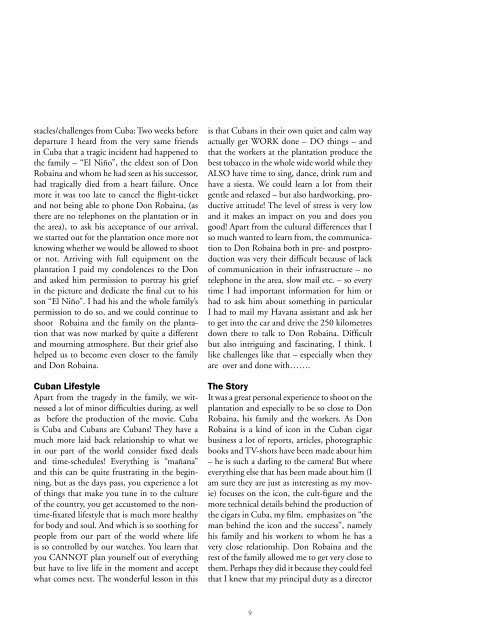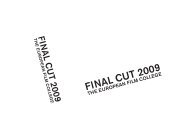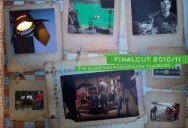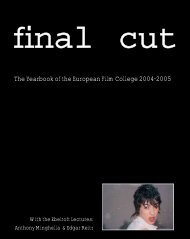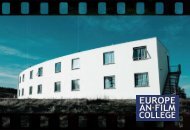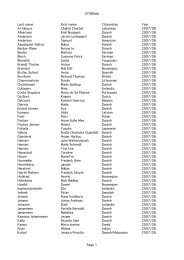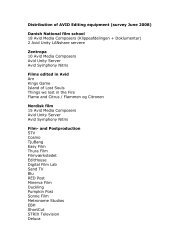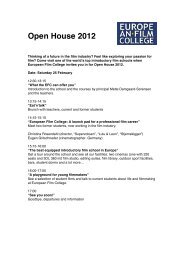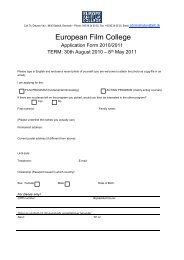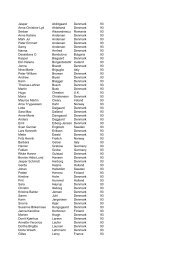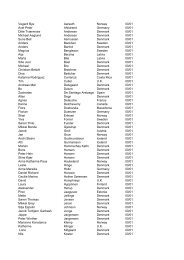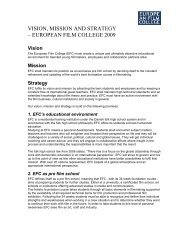yearbook 2004/05 - The European Film College
yearbook 2004/05 - The European Film College
yearbook 2004/05 - The European Film College
You also want an ePaper? Increase the reach of your titles
YUMPU automatically turns print PDFs into web optimized ePapers that Google loves.
stacles/challenges from Cuba: Two weeks before<br />
departure I heard from the very same friends<br />
in Cuba that a tragic incident had happened to<br />
the family – “El Niño”, the eldest son of Don<br />
Robaina and whom he had seen as his successor,<br />
had tragically died from a heart failure. Once<br />
more it was too late to cancel the flight-ticket<br />
and not being able to phone Don Robaina, (as<br />
there are no telephones on the plantation or in<br />
the area), to ask his acceptance of our arrival,<br />
we started out for the plantation once more not<br />
knowing whether we would be allowed to shoot<br />
or not. Arriving with full equipment on the<br />
plantation I paid my condolences to the Don<br />
and asked him permission to portray his grief<br />
in the picture and dedicate the final cut to his<br />
son “El Niño”. I had his and the whole family’s<br />
permission to do so, and we could continue to<br />
shoot Robaina and the family on the plantation<br />
that was now marked by quite a different<br />
and mourning atmosphere. But their grief also<br />
helped us to become even closer to the family<br />
and Don Robaina.<br />
Cuban Lifestyle<br />
Apart from the tragedy in the family, we witnessed<br />
a lot of minor difficulties during, as well<br />
as before the production of the movie. Cuba<br />
is Cuba and Cubans are Cubans! <strong>The</strong>y have a<br />
much more laid back relationship to what we<br />
in our part of the world consider fixed deals<br />
and time-schedules! Everything is “mañana”<br />
and this can be quite frustrating in the beginning,<br />
but as the days pass, you experience a lot<br />
of things that make you tune in to the culture<br />
of the country, you get accustomed to the nontime-fixated<br />
lifestyle that is much more healthy<br />
for body and soul. And which is so soothing for<br />
people from our part of the world where life<br />
is so controlled by our watches. You learn that<br />
you CANNOT plan yourself out of everything<br />
but have to live life in the moment and accept<br />
what comes next. <strong>The</strong> wonderful lesson in this<br />
is that Cubans in their own quiet and calm way<br />
actually get WORK done – DO things – and<br />
that the workers at the plantation produce the<br />
best tobacco in the whole wide world while they<br />
ALSO have time to sing, dance, drink rum and<br />
have a siesta. We could learn a lot from their<br />
gentle and relaxed – but also hardworking, productive<br />
attitude! <strong>The</strong> level of stress is very low<br />
and it makes an impact on you and does you<br />
good! Apart from the cultural differences that I<br />
so much wanted to learn from, the communication<br />
to Don Robaina both in pre- and postproduction<br />
was very their difficult because of lack<br />
of communication in their infrastructure – no<br />
telephone in the area, slow mail etc. – so every<br />
time I had important information for him or<br />
had to ask him about something in particular<br />
I had to mail my Havana assistant and ask her<br />
to get into the car and drive the 250 kilometres<br />
down there to talk to Don Robaina. Difficult<br />
but also intriguing and fascinating, I think. I<br />
like challenges like that – especially when they<br />
are over and done with…….<br />
<strong>The</strong> Story<br />
It was a great personal experience to shoot on the<br />
plantation and especially to be so close to Don<br />
Robaina, his family and the workers. As Don<br />
Robaina is a kind of icon in the Cuban cigar<br />
business a lot of reports, articles, photographic<br />
books and TV-shots have been made about him<br />
– he is such a darling to the camera! But where<br />
everything else that has been made about him (I<br />
am sure they are just as interesting as my movie)<br />
focuses on the icon, the cult-figure and the<br />
more technical details behind the production of<br />
the cigars in Cuba, my film, emphasizes on “the<br />
man behind the icon and the success”, namely<br />
his family and his workers to whom he has a<br />
very close relationship. Don Robaina and the<br />
rest of the family allowed me to get very close to<br />
them. Perhaps they did it because they could feel<br />
that I knew that my principal duty as a director


